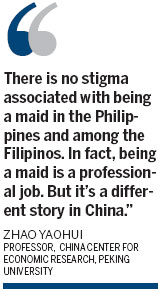Economy
Demand for Filipino maids on the rise
By Karen Yip (China Daily)
Updated: 2010-11-08 09:27
 |
Large Medium Small |
|
 |
|
A Filipina maid demonstrates her babycare skills during a lecture to her Chinese counterparts in Chengdu, Southwest China's Sichuan province. [Photo/ China Daily] |
But many break the law by giving them employment, say experts
BEIJING - Trustworthy, industrious, highly educated, English-speaking, fun and caring - these are some of the qualities that Filipino workers are known for worldwide.
It's little wonder then that increasing numbers of Chinese families who can afford to pay more are willing to hire Filipina maids, even at the expense of flouting the law.

Four-year-old Sophia Wang (not her real name) says she is closer to Auntie Tess - a name that she fondly calls her Filipina maid - than she is to her own mom and dad.
Her parents, both working professionals in their mid-30s, let Auntie Tess or Maria Teresa Cruz (not her real name), 48, who hails from Batangas in Luzon, in the Philippines, take charge of the household.
"She will grow up to think and behave like half a Chinese and half a global citizen," said Maria Teresa, who has worked as a maid in Saudi Arabia, Hong Kong and Malaysia for 10 years in total.
That is already evident: Sophia Wang is different from her Chinese classmates at a public school.
She naturally speaks fluent English. She doesn't waste food because she was trained to finish her meals. She tidies up after playtime. Like a typical Filipino, she enjoys singing, dancing, a sense of adventure and speaks her mind. Imitating her maid, who is a staunch Catholic, she prays but has yet to fully grasp the meaning of religion.
"She will be special. If she throws tantrums, she is immediately silenced. I have seen spoilt Chinese kids throw shoes or beat their Chinese maids and they are allowed to do it. I also make sure she changes her clothes every day," said Maria Teresa, beaming with pride.
After a personal introduction, her Chinese employers took an instant liking to her. She has lived with the Chinese family for two years on a business visa that her employers take the effort to renew every three months with the help of an agent.
She makes 3,500 yuan a month ($525), twice the average salary of a Chinese maid. In Beijing alone, the starting monthly salary for a Filipina maid is estimated to be 3,000 yuan.
The Wang family, together with Maria Teresa, will spend Christmas this year at Hong Kong Disneyland.
It is estimated that there are eight million Filipinos working abroad. In 2009, they sent home $17.3 billion, according to data from Bangko Sentral ng Pilipinas, the central bank of the Philippines.
Overseas Filipino workers (OFWs) sent $15.9 billion of remittances to the Philippines in 2008, up from the $14.4 billion in 2007, and $13 billion in 2006.
Money sent home by OFWs is a major contributor to the Philippine economy through the creation of new businesses and consumption, property purchases, and financing education.
Currently, foreign maids are not allowed to work in China. The only official way foreign maids can do so is if their employers are diplomats. Chinese laws allow diplomats to bring their personal staff of any nationality into the country.




